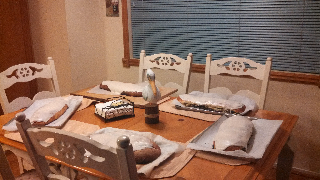
Note: Right now, with things getting done around the house and us getting organized, I haven’t taken any photos yet but will do so soon. Thanks for your patience.
As each day passes, we get a little more settled in. I’ve unpacked everything I need to use while here and left the remainder in the bags sitting open on the beds in both guest rooms. When it’s time to go, it will be easy to pack. Tom has done the same, only wearing a few different shirts and pants.
We haven’t been able to use the pool yet since it’s been cloudy and rainy. But once the sun appears, we certainly will. Start using it. The pool guy has been here twice since we arrived, and it looks cool and refreshing. It’s been warm and humid most days, and we’ve certainly used the aircon in the bedroom at night and the living room. We are conscientious about turning it off when we leave the room or go out and about.
Yesterday, the little store here in the gated community was open. It’s only open Monday, Thursday, and Friday, so we jumped in the car and stopped there to see about buying jugs of bottled water and to check out their inventory. We purchased a one-pound filet mignon that would be enough for one meal, a giant jug of water, and a few odds and ends. A small box of Kleenex was $4.50. The filet was $10, and the big 19-liter water jug was $1.40.
The owner of the store, Gilles, from Ontario, Canada now, after eight years living here, has a strong Spanish accent but speaks English, and we were able to ask him many questions about the area. He was very kind, and indeed, we’ll continue to stop there for eggs, water, and possibly meat since he has a small inventory.
Anything to avoid making that long drive to Manta for groceries, including the difficulty finding a parking spot and the commotion in the market. We were able to purchase most of the items we needed and may never be able to find them here. We’ll continue to stop at the little markets we encounter.
It was wonderful having a nice dinner last night. Without vegetables, I ate just the chicken. Tom had chicken and rice. When we head to Puerto Cayo in the next few days, we’ll look for the farm stand I read about online in the famous expat town. There’s no significant market there, but perhaps we can find a few things we’d like, such as green beans, broccoli, asparagus, and cauliflower.
I have four avocadoes sitting on the kitchen window sill to ripen, but it could be a week before they are ready to eat. A half of a sliced avo is an excellent addition to any meal for me. Tom, not so much. I don’t enjoy just eating meat and no sides, and Tom always enjoys rice on the side.
Last night, we enjoyed speaking to our friends, Kathy and Don, in Hawaii. We are planning to meet up in Marloth Park next year. They have been such wonderful friends, as have many others, and we always feel blessed for our friends and family members. It was great spending so much time with everyone in Nevada and Minnesota.
Now that we’re in the same time zone as Minnesota, we’ll easily be able to talk to family members anytime. What a treat that is!
As for the house, we don’t have any hot water. I reported this to Igor, the property owner, and hope to hear back soon. It’s been challenging taking showers and doing dishes in cold water. We are still waiting for the WiFi solution for the upper level. We gave up trying to get the electric kettle to work, and I am using a small pot to boil water for my decaf coffee and tea. Adaptation always prevails. But, the cold showers and dishwater aren’t something we feel we can adapt to.
I still have Afib. Even taking the potent drug. In the next few days, we’ll head to a pharmacy to buy more of the drug in case I need to up the dose. At this point, I am at a moderate dose with an option to increase the dose if necessary. It makes me feel shaky and out of sorts, but it’s what I have to do now during this period. It was prescribed for me last April when I was in hospital for Afib, but I’d never taken it until now when I had fewer symptoms.
It is estimated that the prevalence of Afib in the US ranges from 2.7 million to 6.1 million. This number is expected to rise to 12.1 million by 2030. It’s become more prevalent since people have discovered it using their fitness watches when they get an alert on their device that it detects Afib. My Fitbit does this, but I can feel it when my sinus rhythm is abnormal. Some people don’t feel any symptoms at all. I am not unique with these symptoms, but I’d like to learn how to manage it better.
That’s it for today, folks. Have a fantastic Friday.
Be well.
Photo from ten years ago today. October 27, 2013:













































